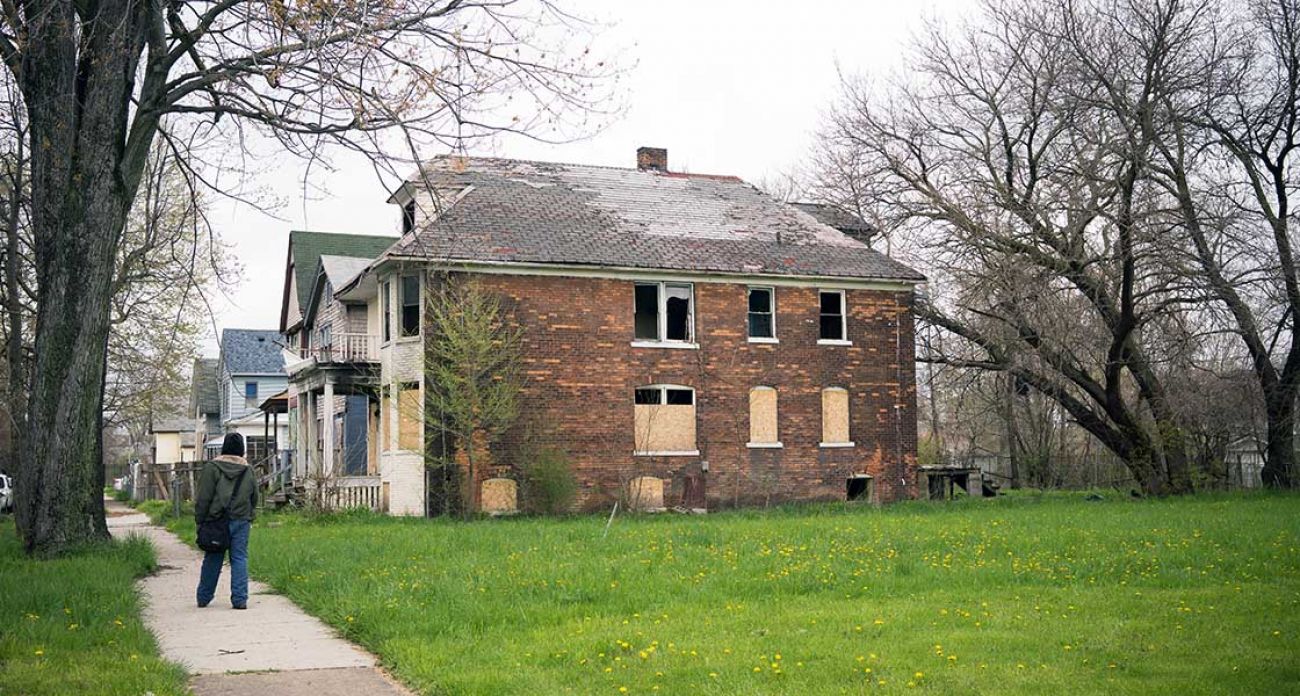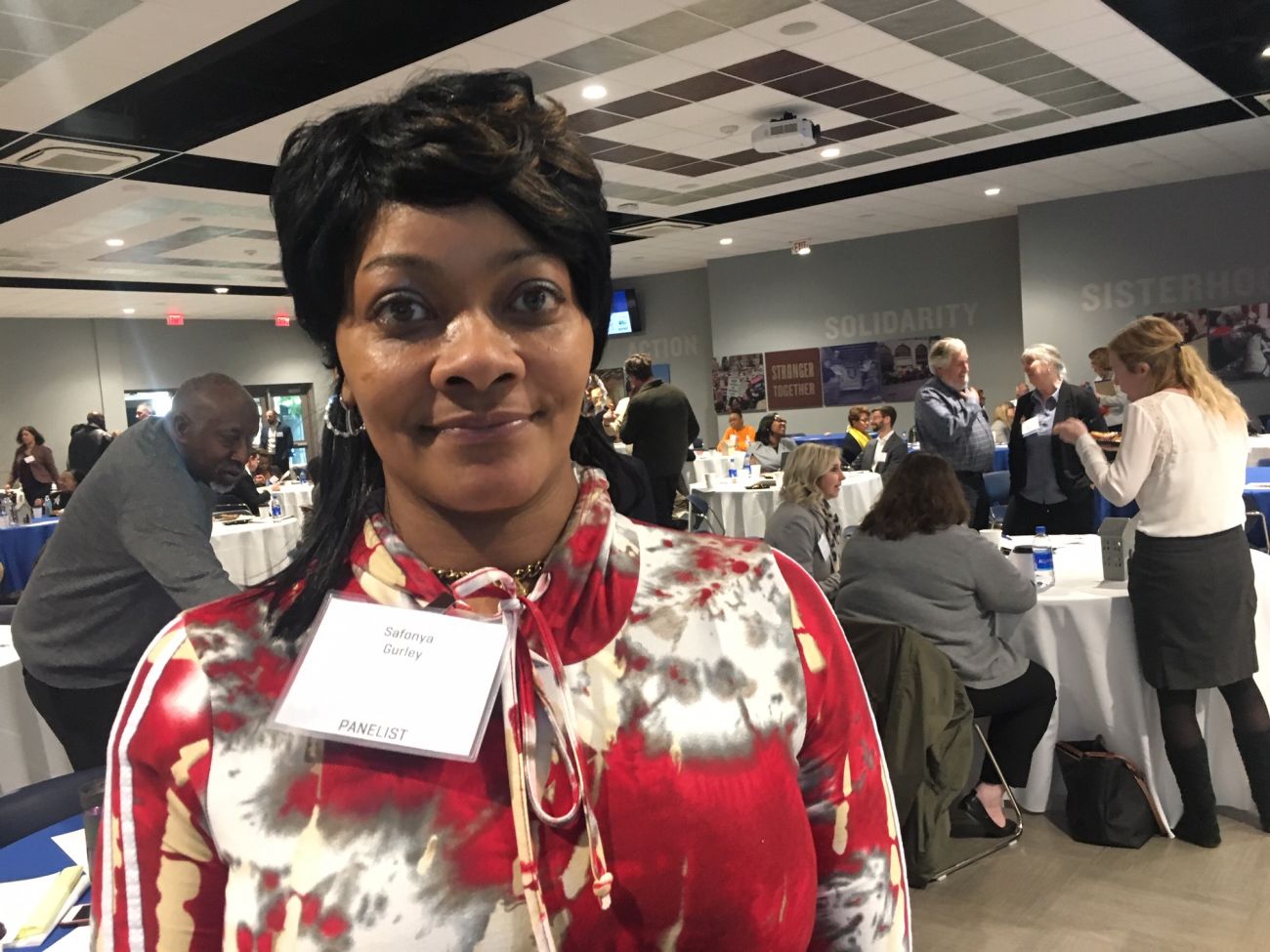One in five Detroit rentals face eviction. Time to call in the lawyers?

DETROIT – Safonya Gurley says she got the call on Thanksgiving: She was getting evicted over $5,000 in back rent.
Never mind that the house on Detroit’s east side was a wreck with no running water, persistent mold, a broken toilet and flooded basement – or that Gurley couldn’t get the management company on the phone and faithfully put her monthly $600 rent in an escrow account toward repairs.
“Evicted? For what?” Gurley recalled with disgust, speaking at a forum about eviction in Detroit on Tuesday.
She’s far from alone. For the past several years, more than 30,000 annual evictions are filed at Detroit’s 36th District Court. That means roughly 1 in 5 of the city’s rentals face evictions each year, according to a recent analysis by The Detroit News.
Related:
- Banks are lending again in Detroit … if you live in the right neighborhood
- Poor people at risk of eviction as tax credits expire and Detroit revives
- Detroit wants to extend its comeback to neighborhoods. So far, it’s a slow go
- Real estate is hot in Detroit. But its top owner, the city, isn’t selling.
The deluge of evictions is yet another symptom of a housing crisis that has decimated Detroit, flipping the city from having the one of the nation's best home ownership rates among African Americans to being a majority-rental city.
Now, a decade after evictions accelerated due to the subprime mortgage bust, a group of housing advocates, law firms and foundations are teaming to search for solutions.
With opening remarks from Michigan Supreme Court Chief Justice Bridget Mary McCormack, a diverse coalition including officials from Ford Motor Co., the United Way of Southeastern Michigan and DTE Energy met all day Tuesday in a union hall near downtown Detroit.
One big idea: ensuring that all tenants facing eviction are defended by lawyers in court.
In 2017, only 3 to 5 percent of Detroit tenants with eviction cases were represented by lawyers, according to research from Neil Steinkamp, a consultant who also has studied eviction in New York and Philadelphia.
That’s about half the rate of similar cities, Steinkamp said. Tenants who wander into court alone rarely reach agreements to stay in their homes: Only 28 percent, compared to 62 percent for those with lawyers.
Like many housing issues, Detroit is far worse off than comparable cities, Steinkamp told Bridge. Philadelphia, for instance, has more than twice the population of Detroit, but historically only 22,000 evictions per year, he said.
“We’re always busy,” said Steve Babson of the Detroit Eviction Defense activist group that fights to keep tenants in homes.
“We’ve gone from evictions because of mortgage foreclosures, tax foreclosures and now lease-to-land contracts (rent-to-own,)” Babson told Bridge. “This has all done great harm to Detroit neighborhoods.”
The displacement has a trickle-down effect throughout the city, panelists said Tuesday.
Not only do evictions lead to blight and health problems, but the displacement of students makes it harder to learn and fuels chronic absenteeism.
That’s a problem for Detroit schools that Bridge Magazine and reporting partner Chalkbeat highlighted last year in its series “The Children of 8B,” which focused on a middle school homeroom where 31 eighth grades had collectively attended 128 schools.
A different conversation
In 36th District Court, which serves Detroit, there are so many evictions that four separate courtrooms are dedicated to them. Judges can process hundreds of evictions before lunch.
Gurley said she won her case thanks to a pro-bono attorney whose evidence forced the “judge to open his eyes wide and big.” But she was shocked at what she saw in the court, she said.

“There were so many people signing the judgments (of eviction),” Gurley said. “When it comes down to your word against the landlords, you are always going to lose.”
“I know in my heart that if I hadn’t had a lawyer, I would have lost that case,” she added.
In 2017, New York began a program that guarantees attorneys to low-income tenants. The city will spend about $155 million on the effort, but a study by Steinkamp estimated the city would save $320 million, largely because of savings from costs to shelter those who are displaced.
Since then, San Francisco and Newark have similar programs while others are studying the issue, said Steinkamp, a managing director of Stout, a New York consulting firm.
“When you talk about funding lawyers, it’s like ‘What?’” Jennifer Bentley, executive director of the Michigan State Bar Foundation, said during Tuesday’s forum.
“But when you talk about funding lawyers to help people and make a difference and keep people in their homes, the conversation is different.”
Tuesday’s meeting marks the beginning of the dialogue, Steinkamp said.
As with many big problems in Detroit, from crime to schools to blight and housing and water affordability, easy answers are elusive.
Deep problems
Gurley knows all too well about big problems.
After winning her eviction case, she said she made repairs to the home, painting and installing a water heater.
She’s still renting, but Gurley said the owner is an investor who lives in Las Vegas. In less than one year, she said two separate management companies have collected her rent and raised it from $600 to $750.
Now, she said, the home is in foreclosure because of back taxes. She’s hoping to save enough money to buy it at auction this fall.
“I’ve done so much work, I’d like to keep it,” Gurley told Bridge. “But the problems are deep. So deep.”
Related:
See what new members are saying about why they donated to Bridge Michigan:
- “In order for this information to be accurate and unbiased it must be underwritten by its readers, not by special interests.” - Larry S.
- “Not many other media sources report on the topics Bridge does.” - Susan B.
- “Your journalism is outstanding and rare these days.” - Mark S.
If you want to ensure the future of nonpartisan, nonprofit Michigan journalism, please become a member today. You, too, will be asked why you donated and maybe we'll feature your quote next time!

